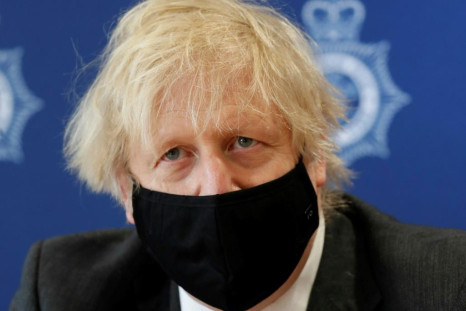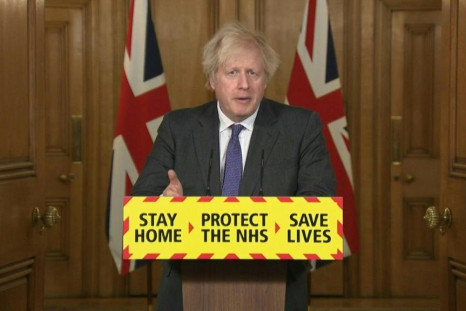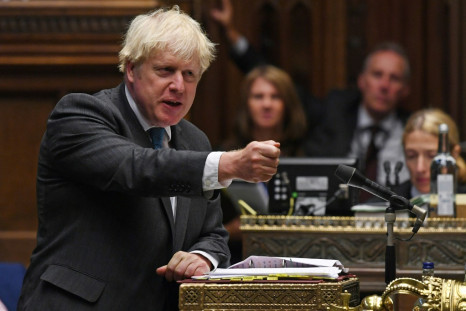Home
> United Kingdom
United Kingdom
Prison officer gives birth to murderer's baby after sordid affair
The affair was uncovered after an unauthorised mobile device was found in the prisoner's cell.
Christine Caparras Mar 26, 2021
Vaccinated British tourists may be allowed to holiday in Greece as early as May
The rest of the European Union thinks it is still too soon to open borders freely to tourists.
Christine Caparras Feb 24, 2021
Groom-to-be gets cancer and COVID-19 diagnosis on same day
The devastated man found out he has incurable cancer just an hour after testing positive for COVID-19.
Christine Caparras Feb 23, 2021
Pubs, outdoor cafes set to reopen as UK eases lockdown
One in three adults in the UK has already received the first dose of the COVID-19 vaccine.
Christine Caparras Feb 22, 2021
Valentine's Day manhunt launched for serial sex attacker
Swansea police has released a photo of the cyclist who is believed to be behind a string of sexual attacks last Friday.
Christine Caparras Feb 14, 2021
£20k reward offered to find trainee lawyer's killers: 'He was killed for fun' says mum
The 22-year-old was attacked and stabbed to death by a group of eight youths.
Christine Caparras Feb 09, 2021
British millionaire drowns in Barbados after ignoring locals' warning
The businessman was told that the currents were unsafe for swimming.
Christine Caparras Feb 04, 2021
Four family members die of Covid-19 after leaving 10-month isolation for Christmas party
The wife of one of the deceased is blaming UK Prime Minister Boris Johnson for allowing families to meet during the holidays.
Christine Caparras Jan 28, 2021
Entertainment industry jobs no longer exempted from UK travel restrictions amid pandemic
Film and TV crew are no longer exempt from coronavirus restrictions related to job travel
Aayush Sharma Jan 20, 2021
2-year-old fatally mauled by dog banned under UK's Dangerous Dogs Act
The child was reportedly attacked by a Dogo Argentino, which is banned from being kept as a pet in many counties around the world.
Agrima Tikader Nov 10, 2020
Watch as police officer shoves bagpiper at The Cenotaph on Remembrance Day
A video apparently revealed that the Scots Guards veteran had pre-planned the provocation leading to the incident that caused outrage.
Agrima Tikader Nov 09, 2020
Two British teens dead and one critical after parasailing accident in Greece
The tour operator may face manslaughter charges for ignoring multiple health and safety laws put in place to avoid such accidents.
Agrima Tikader Nov 02, 2020
Netflix subscription rates in the UK speculated to go up soon following US price hike
As detailed by the company, the reason behind the new rates is to supposedly deliver more value for its customers in the United States.
John Diente Nov 02, 2020
67-year-old British man dies in Japanese jail during imprisonment for smuggling drugs
The man died just one year into his sentence for trying to smuggle 2.1 kilograms of amphetamines into the country.
Agrima Tikader Oct 22, 2020
Coronavirus: UK reasearchers prepare for controversial human challenge trials
Given the urgency brought upon by the pandemic, government healthcare officials are pressured to deliver positive results.
John Diente Oct 21, 2020
Start-up medical drone delivery service receives backing from UK Space Agency
Similar to the ones that were introduced before it, the service will transport protective equipment, test kits, and samples to and from hospitals.
John Diente Oct 19, 2020
Apple enables Health Records feature for users in the UK and Canada
Health Records first launched in the United States in 2018 with only a few healthcare institutions supported.
John Diente Oct 09, 2020
COVID-19 vaccine: Experts urge public not to expect dramatic changes
Even with the help of the United States' Operation Warp Speed initiative, it would likely take several months for doses to become accessible globally.
John Diente Oct 08, 2020
Superbike racer accused of domestic abuse after wife falls to her death from Dubai hotel
The woman fell from the window of the hotel in Dubai as her family claims she was a victim of domestic abuse.
Agrima Tikader Oct 07, 2020
Two men arrested for rape and murder of Lancashire doctor and daughter
The murder investigation was launched when the bodies of the woman and the teen were discovered in their home.
Agrima Tikader Oct 05, 2020
Air hostess arrested for drug dealing following COVID-19 job loss
After losing her job, the air hostess started storing and transporting drugs for her boyfriend, she met on a dating site.
Agrima Tikader Sep 30, 2020
NHS COVID-19 app encounters another major issue, draws criticism once again
Following the controversial failure of the "Operation Moonshot" mass testing this is another setback that might lead to a public outcry.
John Diente Sep 28, 2020
Man brutally bludgeons seagull to death for stealing sandwich
A petition has been created to urge the prosecution of the man responsible for the wild animal's death.
Agrima Tikader Sep 18, 2020
COVID-19 testing debacle in the UK draws harsh criticism from top lawmakers
Resources currently available were purportedly insufficient to handle the demand, which led to backlogs among several laboratories.
John Diente Sep 17, 2020
Killer whales launch unusual attack on boats leaving sailors injured
Scientists baffled by the string of unusual activity exhibited by the mammals near Portugal and Spain.
Agrima Tikader Sep 14, 2020
NHS COVID-19 contact tracing app to require businesses to put up QR code for users to scan
Establishments that normally see folks gather for more than 15 minutes will be asked to put up QR code posters designated by the government.
John Diente Sep 14, 2020
AstraZeneca virus vaccine final phase trials resume after setback: University of Oxford
Even though the delay might have surprised the public, those involved with the development of vaccines and drugs are familiar with instances such as this.
John Diente Sep 14, 2020
Four arrested after sexual assault of two British teens in Italy
The police swiftly arrested a group of men after the teens managed to fight off the attackers and report the crime.
Agrima Tikader Sep 11, 2020
Dental experts warn against TikTok trend of whitening teeth with bleach
TikTok users have been using hydrogen peroxide to whiten their teeth claiming it to be a cheaper alternative to whitening strips and dentist visits.
Agrima Tikader Sep 10, 2020
5G and 4G services to improve after UK regulators fully clear 700 MHz spectrum band
This was a major undertaking that reportedly took four years at a staggering cost of £350 million to establish the infrastructure to support it.
John Diente Sep 04, 2020
Pages
- PREV
- 9
- 10
- 11
- 12
- 13
- 14
- 15
- 16
- 17
- NEXT































